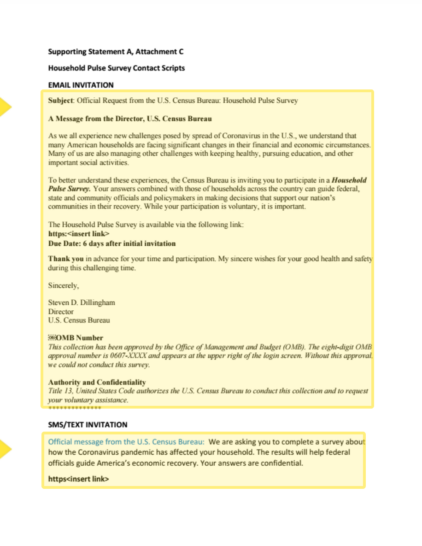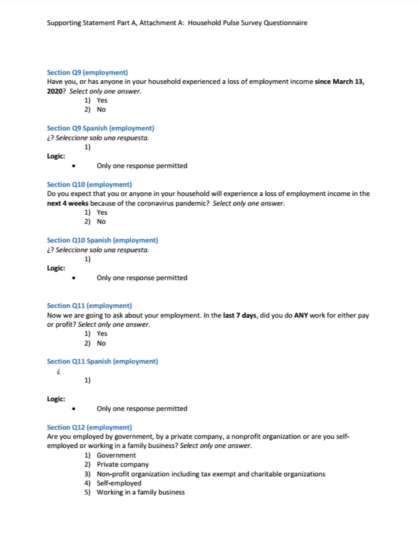Getting COVID-19 emails from the Census Bureau? How to tell scams from the real thing

Have you been getting COVID-19 emails from the Census Bureau, or heard about someone receiving messages with coronavirus-related information? While you may be tempted to chalk these communication attempts up as a scam, don’t be so quick to discount them.
It may seem odd to receive COVID-19 emails from the Census Bureau, but it really will be sending them over the next few months. It’s still important to know coronavirus scams are going around and may land in your inbox in the form of a fake Census Bureau email. Tap or click here for 8 tips to avoid coronavirus scams.
Let’s take a look at what the Census Bureau emails will look like along with some of the coronavirus scams that are going around so you can spot the differences.
Census Bureau COVID-19 emails: What are they and what will they look like?
The Census Bureau — which is in charge of taking a headcount and gathering other pertinent information from all homes in the country for the constitutionally mandated census — hasn’t been in the business of sending out emails (at least not in the years prior to 2020).
But, 2020 isn’t like any other census year thanks to the coronavirus pandemic, which has led the Census Bureau to roll out an experimental “Household Pulse Survey.” These emails are to help measure the ways in which COVID-19 is affecting households in the U.S.
According to the Census Bureau website, “The new Household Pulse Survey is designed to deploy quickly, and efficiently collect data on how people’s lives have been impacted by the COVID-19 pandemic. Data will be disseminated in near real-time to inform federal and state response and recovery planning.”
It’s unclear when the surveys will roll out, though it could be as early as this week. What is clear, though, is if you receive an email from the official Census Bureau, it should contain a link to a secure online form for you to fill out. Here’s an example of what the message will look like:

It won’t ask you to reply by email with any private information. If it does it’s a sure sign of a scam. Tap or click here to learn how to spot coronavirus scam emails, bogus sites, and alerts.
If you receive one of the Census Bureau emails to participate in the survey, you can expect to answer questions on coronavirus-related issues like:
- Your employment status and whether it’s been affected by COVID-19
- Whether you have enough food to eat in your home
- The amount of time you’ve spent educating your children at home
- Your mental health status (whether you’ve been suffering from anxiety or depression due to coronavirus)

Participation in the survey is voluntary and questions will be available in both English and Spanish. As with the Census, the information gathered by this survey is supposed to be used to help lawmakers understand how COVID-19 has affected your household overall.
This type of information can help better inform policymakers about what people need and help them decide on what steps to take to handle the crisis. The survey results will also be published weekly on the Census Bureau website.
Census-related coronavirus scams
Now that you know what a Census Bureau email and survey will look like, it’s important to take a look at what some of the common Census-related coronavirus scams look like so you can differentiate between the two. Tap or click here to find out what to watch out for.
One of the more recent scams has involved fake Census Bureau workers contacting people and claiming they must respond to the 2020 Census to get the coronavirus stimulus payment.
In most cases, people are receiving phone calls from someone pretending to be with the Census Bureau, and the scammers say they have your federal relief money and need your bank account information to process it. What they’re doing instead is wiping your accounts clean and stealing any information they can in the process.
The issue has become so prevalent that it led to Florida’s Attorney General Ashley Moody and lawmakers or law enforcement in other states to warn people that scammers are using this method to try to steal their personal information.
The Census Bureau has also issued a statement on its website about any misinformation related to the Census and your coronavirus stimulus payments.
Per the Census Bureau website: “Your answers (on the Census or Census-related surveys) cannot be used to impact your eligibility for any government benefits, including any potential stimulus package.”
The Better Business Bureau has also warned people that the Census Bureau will never ask for your full Social Security Number, money, donations, anything on behalf of a political party, your full bank or credit account numbers, or your mother’s maiden name.
If you’re asked for this information, it should be a clear warning that you’re likely being scammed.
According to USA.gov, “Some scam artists may pretend to be work for the Census Bureau. They’ll try to collect your personal information to use for fraud or to steal your identity. These scam artists may send you letters that seem to come from the U.S. Census Bureau. Others may come to your home to collect information about you.”
Tips for avoiding Census Bureau-related coronavirus scams
If you want to protect yourself from scammers using the Census Bureau name:
- Verify that the study is legitimate and check the survey name on the Census Bureau’s list of surveys.
- If someone comes to your home and claims to be a census worker, take the time to verify that they work for the Census Bureau.
- Look up the employee’s name in the Census staff directory to confirm they actually work for the bureau.
- Ask to see their badge — a Census Bureau badge has a picture of the field agent, a Department of Commerce watermark, and expiration date.
- The Census Bureau won’t ever ask for your full Social Security Number, bank or credit card account numbers, or your mother’s maiden name. So don’t share that information with anyone asking for it while claiming to work for the bureau.
- Don’t trust caller ID — call the Census Bureau’s National Processing Center to verify a telephone survey.
Now that you can distinguish between a scam and real communications from the Census Bureau, you can participate in full confidence. Just remember, always proceed with caution as scammers constantly change things up to take advantage of everything newsworthy.
Tags: coronavirus, COVID-19, email, fraud, pandemic, personal information, scam, scams, security, stimulus payment, survey
